'For people who are fed on nothing else but the media, what were prejudices become facts of life.'
'What my neighbour may see as just news, for me is a source of fear, living as I do, surrounded by non-Muslims.'
'So I would say it is important to talk to a Muslim, be it your neighbour or your colleague.'
'Have that conversation about what's happening to Muslims.'
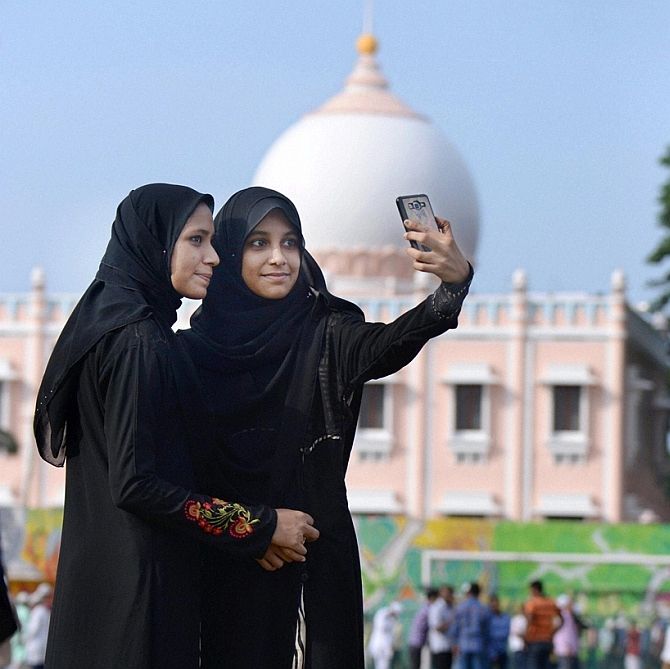
Mothering a Muslim, which revealed the ignorance, contempt and even hate that Muslim students encounter at the country's best schools, brought Nazia Erum into the limelight.
Nazia has since become a much followed voice on social media and was the name most associated with the #TalktoaMuslim Twitter campaign though she was not its originator.
In Mumbai to participate in a discussion on freedom of speech today as compared with the Manto era, Nazia spoke to Jyoti Punwani about her book, about self-censorship and her continuing attempts to celebrate the diversity that is the distinguishing feature of our country.
Speaking about freedom of speech, you must have experienced a backlash to your outspokenness on social media. Has that restricted you in any way?
Yes, of course. It's not possible today to speak out without provoking a backlash. This applies to either side of the conversation.
Freedom of speech is so much more democratic now. It's very easy to express your viewpoint and today, everybody has a viewpoint.
When my book came out, it was like World War III had broken out on my Twitter timeline!
But while having become more democratic, freedom of speech today expresses itself in more judgemental ways, and that too very quickly. Readers don't bother reading beyond the headline.
Sometimes I've found a sarcastic headline has been taken seriously and judged accordingly. I've learnt that when you want to put something out there, sarcasm doesn't work!
So, have these instant judgmental reactions made you tone down your comments?
We all self-censor a lot. Self-censorship is one of the starting points today. You always think of the audience out there.
When I was writing Mothering a Muslim, I knew I didn't want only the 'liberals' to read it.
I wanted people who wouldn't normally agree with me to step into my shoes.
I had to write those stories in a way that the reader is there with the child.
So I had to make myself an objective fly on the wall, put my emotions out of the way, lest they colour the story in a way that would put off the readers I was aiming for.
I think because of the way it is written, the book broke through the Right/Left discourse.

Did the response to the book surprise you?
In the first month, the book made headlines here and in the international press. But it really picked up three months later.
Suddenly, every single day there was a social media post, an e-mail to me. People were talking about it as if they had made it their own. It had become part of their lives.
There was this woman who was on the opposite side politically, she always contradicted everything I wrote on Facebook, so much so that I wanted to remove her from my timeline.
One day she messaged me to say, "I read your book. Finally I know what it's like to be in your shoes."
The principal of Welham School -- and she's an institution in herself -- told me, "I have learnt the biggest lesson of my life from your book."
The principal of a school in Darbhanga, Bihar, wrote to me that after reading it, he had held a session with his teachers.
I think it had this impact because I was just sharing the truth as it is.
Then there were the young people who felt glad to know they were not alone in facing this hate in school, there were so many others.
The silence around it had made them feel they were alone.
Many parents felt empowered by it. They could show it to the authorities and say: Look, this is what we have been talking about.
My husband has written three bestsellers, but this experience was something else. This book had acquired a life of its own.
What about non-Muslim students? Any reaction from them?
I was recently at a Knowledge Conclave where students from all the top schools: Mayo, Welham, Sanawar were present.
I was amazed at the honesty they brought to the table.
These were students from Standard 9 to 12.
In front of a room full of teachers and their classmates they could say things like: "I'm ashamed of what I did"; "My parents and grandparents have told me worst things about Muslims than what's in the book".
You won't find adults being so honest.
It gave me a lot of hope.
You know, social media can be very off-putting. Often you feel, let me just get off it. Then you meet these young people...
Your book talks about elite schools only. What about regular schools?
I chose elite schools on purpose because it's important to be aware that this happens in the best of families and the best of institutions.
With regular schools, people can easily say: "Oh it happens there, not in our circles."
What is the solution? Islamic schools?
One doctor started an Islamic school in Mumbai in the 1990s after seeing the taunts her daughter faced at a well-known Mumbai school.
That's the solution suggested to me by Muslim trolls.
But Islamic schools are not a solution for parents like me.
I want my children to experience India in all its diversity.
I have suggested some solutions in my book.
Is hiring more Muslim teachers one of them?
Yes, making sure you have parity of representation of all religions -- both in student strength and staff -- is one of them.
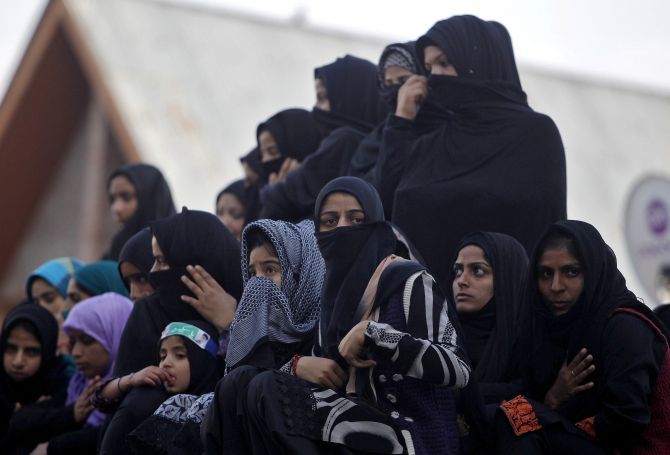
You conducted an inter-faith iftaar last year. Did you do so this year too?
Yes. Actually this year I was quiet because organising it takes up a lot of energy. But people started telling me: Ramzan is starting, remember last year's iftaar?
It was great to see how one idea I had mooted on FB set off what's now become a national trend.
We celebrated inter faith Diwali too. It's a great way for kids to grow up, celebrating all festivals.

Did the same people come this year, or were there newer ones?
We had many new guests because we had requested those who came last year to introduce us to 3 or 4 new people.
How did the non-Muslims respond?
Last year it was around the time triple talaq was in the news.
We wanted to show them that we are not these abla naaris we were being made out to be.
There's more to us than knocking at closed doors for justice (the visual shown on many channels while discussing triple talaq).
We can be successful, presentable.
Among us were all kinds of women: Pilots, journalists, bloggers, entrepreneurs, lawyers...
Many of the guests who had never been inside a Muslim home told us: Where have you women been?
This year, we took it beyond just meeting and greeting.
We gave blank slips to everyone and asked them to write down whatever prejudice about the other community they had grown up hearing, without writing their names.
Then we put them in a bowl and read them out.
A lot of ugly things were written; and there were some difficult moments.
After all, most of those gathered were strangers, and it was not easy either for them or for us. But we had some really experienced women who could handle the situation.
Some of the things written were: "Muslims kill a goat and eat its flesh raw." "They wash the dead body and then drink that water."
I think it's important that these prejudices are aired and discussed.
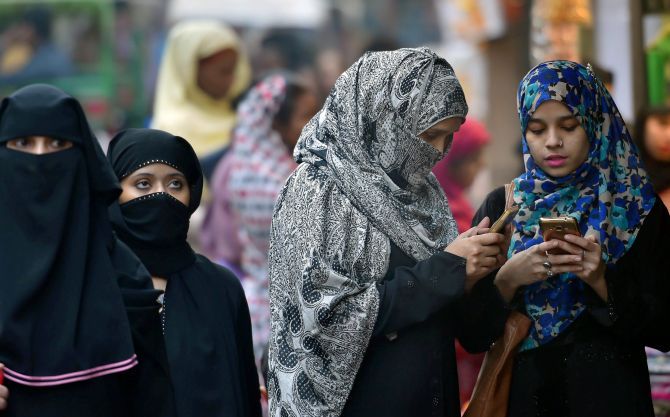
What did the Muslim women write about Hindus?
Not much, mostly that "All Hindus are vegetarians."
We grow up with the majority around us, so we know more about them.
It's the culture around us everywhere, in our residential societies, our workplaces.
You received mixed responses to your #TalktoaMuslim campaign, even from Muslims. Did you expect that?
It wasn't my campaign, I just joined it.
I do understand the other side who were saying, let's not reduce people to their religious identity. But in fact, people today are being reduced to their religious identity. So why not state it as it is?
Strangely, all these people who had opposed it saying such a campaign was not part of the 'Indian ethos', I found them berating Vajpayeeji the moment his death was announced.
Isn't it part of our 'Indian ethos' to not speak ill of the dead till the mourning period is on? I mean he was our PM. The flag was still flying at half mast.
So if you want to talk about 'Indian ethos', be consistent about it.
Some Muslims felt the campaign made them into exotic creatures who had to be sought out.
That was not how it was thought of.
The origin of the idea was Rahul Gandhi's interaction with Muslims, and the furore the BJP made of it.
Rahul Gandhi speaks to all kinds of people, there's nothing wrong if he speaks to Muslims.
I feel the campaign was important because when you have a majoritarian point of view, you miss out a lot of what's happening with minorities.
You read about lynching etc, but you feel it's happening out there. You distance yourself.
Even my neighbour doesn't know how scared I am when my Muslim mutton shop owner sends me mutton through his helper who looks obviously Muslim.
I fear what might be going through the minds of the watchman, of other residents, who see him coming to my house.
My neighbour won't know what I feel when a maid tells me she won't work in my house because I eat beef.
And when I protest, she says: "Aap ke yahan to hota hi hoga (In your house, you must be eating beef)."
She says it as a fact whereas earlier it was just prejudice.
For people who are fed on nothing else but the media, what were prejudices become facts of life.
What my neighbour may see as just news, for me is a source of fear, living as I do, surrounded by non-Muslims. I don't live in a ghetto.
So I would say it is important to talk to a Muslim, be it your neighbour or your colleague.
If you can, have that conversation about what's happening to Muslims. That was the point of that campaign.
Some Muslims would say the best way to avoid this fear is to live in a ghetto.
That's no solution. That's why I say the idea of India is unity in diversity, but the reality of India is ghettos.
We need to work towards realising the idea of India.








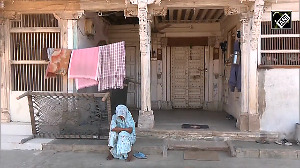
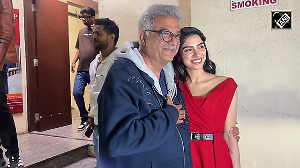

 © 2025
© 2025